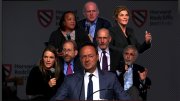Harvard celebrated the launch of the Salata Institute for Climate and Sustainability on Wednesday, October 26, with a symposium at the Radcliffe Institute that illustrated both the breadth of climate-change impacts, and the University’s educational and research capacity to mobilize a broad, interdisciplinary response. (Radcliffe launched a multi-year program on climate change this fall, and the two institutes are collaborating on plans to host scholars and practitioners working on issues of climate justice within Radcliffe’s existing fellowship program.) Scholars from the Faculty of Arts and Sciences (FAS) as well as the schools of public health, government, education, and business spoke at the event about their aspirations for the initiative, which was made possible by a $200 million gift in June from Melanie and Jean Salata.
The challenges ahead are pressing and can seem intractable across a broad range of disciplines, from the impacts of transitioning to a clean energy economy, to coping with domestic political gridlock; researchers are actually devising ways to weaken proposed carbon control strategies to make them more broadly acceptable. And the corporate world is talking about getting to net-zero, but with near zero accountability. In the realm of public health, climate change has already led to unanticipated shifts in disease patterns, and sparked mass migrations. At the same time, there is tremendous potential for innovation, as educators and students alike clamor for action. The level of excitement to tackle these issues, said provost Alan Garber, is “stunning,” and the aim is to make Harvard as successful as possible in addressing global climate problems of all kinds. “Our goal is to be indispensable in finding solutions.”
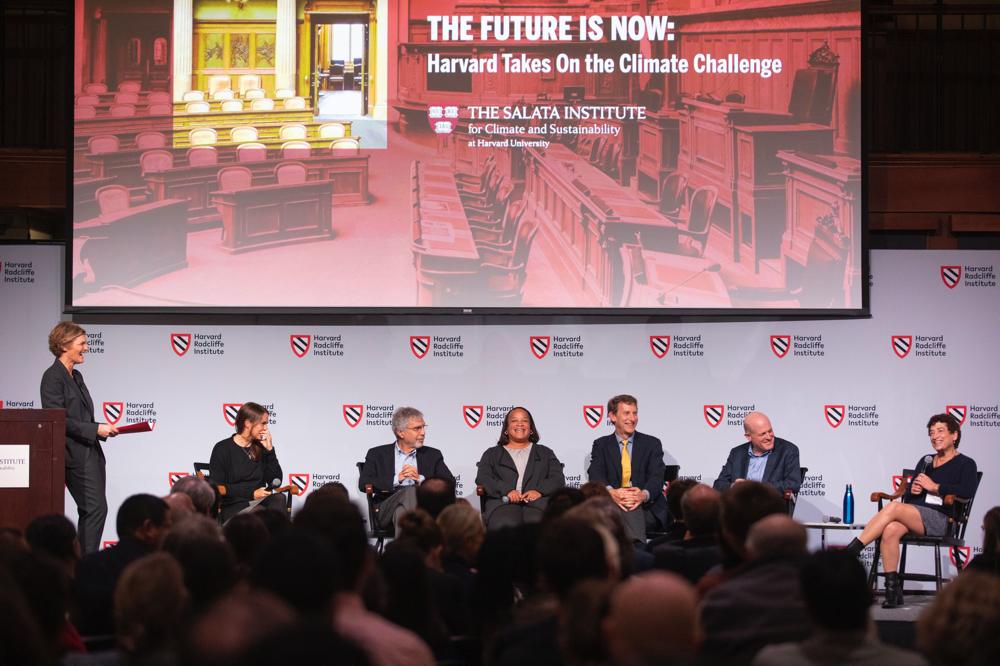
Participants celebrate the launch of the Salata Institute. From left: Jody Freeman, Caroline Buckee, Robert Stavins, Bridget Terry Long, Michael Toffel, Daniel Schrag, Naomi Oreskes.
Photograph by Kris Snibbe/HPAC
Noting that the panelists represented just “a small fraction of our magnificent faculty, many of whom are working on climate-related issues,” moderator Jody Freeman, Cox professor of law and an expert on the legal landscape for addressing climate change, said she aimed nevertheless to convey a little bit about their work and how the Salata Institute is poised to raise its impact, scope, scale and reach to another level. “We hear and we understand the urgency about climate change,” she continued. “We’re all working on this, the University has been working on this problem, in many ways for a very long time, with people doing lots of exciting research. I think, though, we all agree, we want to get to another level…of coordination and… of interaction.”
The Policy and Business Perspectives
Freeman turned first to Meyer professor of energy and economic development Robert N. Stavins, director of the Harvard environmental economics program, and of the Harvard project on climate agreements, to explain policy developments. Internationally, he said, the 2015 Paris Agreement has expanded the scope of climate commitments to most countries, so that emission reduction targets now cover 97 percent of global CO2 emissions, up from just 14 percent under the 1997 Kyoto Protocol. But the challenge is getting the participating countries to adopt more ambitious targets for those emissions reductions. Domestically, the problem is acute: setting carbon targets has proven politically impossible. To address that, a December Harvard workshop will bring together “leading scholars in economics, political science, legal scholarship, and sociology, to…help design carbon pricing mechanisms, [such as] carbon taxes and cap-and-trade programs, that aren’t ideal—they’re not the first best, as economists would say, or second or third best—but are more likely to be politically feasible.”
Heinz professor of environmental management Michael W. Toffel, of Harvard Business School, noted that “There's more and more capital looking for investment opportunities in decarbonization,” which could be an important driver of change. But he worries that ambitious, high-profile corporate “net zero” emissions targets lack accountability mechanisms (see, for example, this discussion of the challenges Harvard Management Company has grappled with in its efforts to reach net zero targets within the endowment). The people setting those goals, he pointed out, will be retired by the time the target date arrives.
Public Health Crises and Educational Opportunities
Freeman then turned to professor of epidemiology Caroline Buckee, associate director of the Center for Communicable Disease Dynamics at the Harvard Chan School of Public Health, to speak about how climate change interacts with her research. (Buckee is an expert in, among other things, the use of mobile phone data to track and model the movements of people and diseases.)
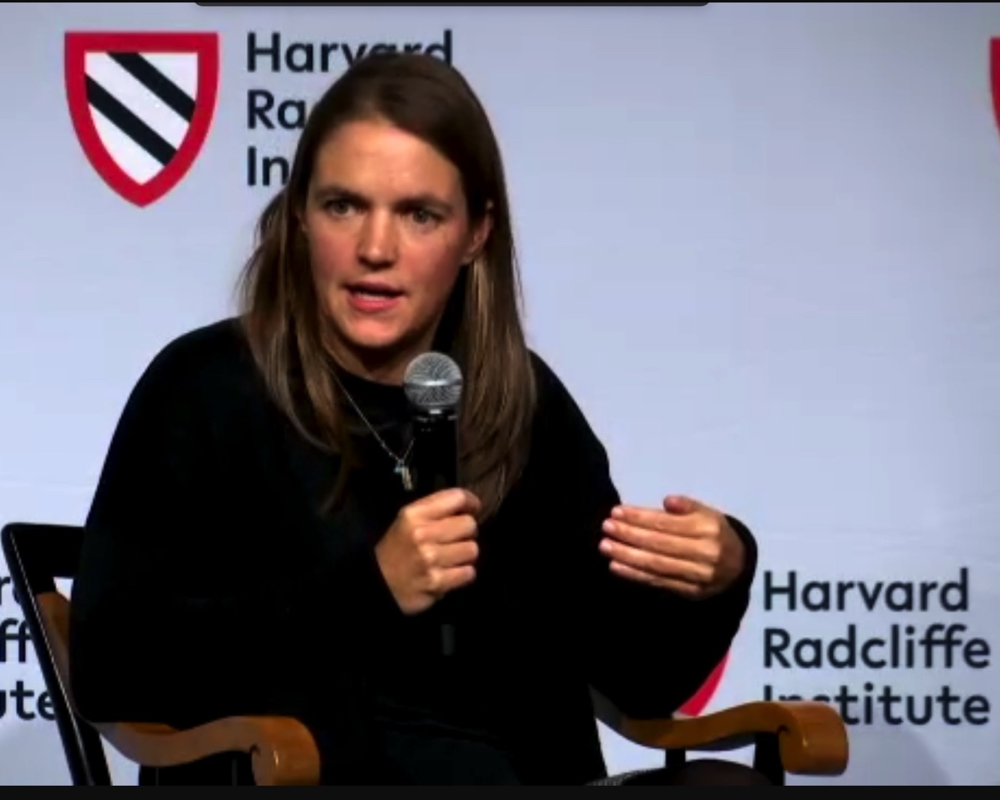
Caroline Buckee
Screenshot by Harvard Magazine
“The impacts of climate change are incredibly complex,” she said. “Vectors are shifting in how they behave; we're seeing more urban malaria dangers in the rural areas, cholera outbreaks, and so on. My personal focus is on migration and mobility. And, you know, 33 million people have been affected by the Pakistan floods. At the moment, Bangladesh is trying to evacuate 2.5 million people in response to cyclones,” she pointed out, but “our health systems are not really set up for mobile populations” as more and more people migrate in response to climate disasters. “And so the health threats facing us are much more complicated than just ‘things will get hotter.’ In fact, there are very complicated social and political and environmental contexts [in which] these health vulnerabilities are going to manifest themselves.…So I think one of the things that the Salata Institute can do is to help us move beyond individual disease silos…to really rethink what we’re doing with surveillance, how we’re going to respond to some of these health vulnerabilities.”
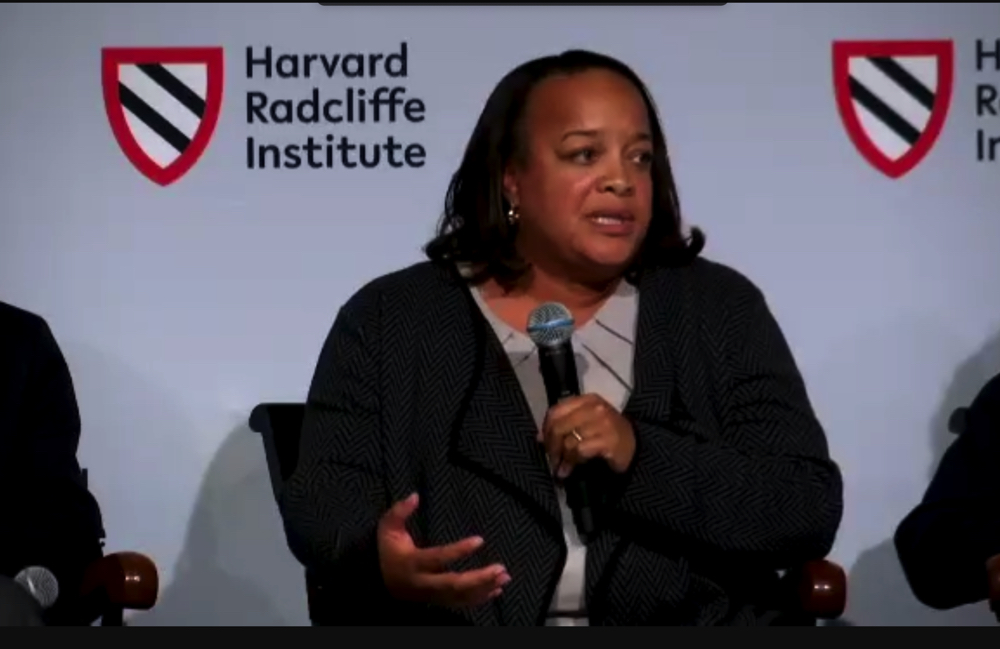
Bridget Terry Long
Screenshot by Harvard Magazine
Graduate School of Education dean Bridget Terry Long spoke about the intersection of climate change and her school’s mission to develop future leaders in the field. The impacts, she noted, are being felt already: in Florida, for example, where Hurricane Ian has closed schools; and last June in Milwaukee during high-stakes student testing in unair-conditioned schools when temperatures reached 100 degrees. Long also pointed out that the education sector is one of the largest consumers of energy, occupies two million acres of land, and operates thousands of school buses. “If you just think about the decisions that leaders in education make, we can do a tremendous amount, not only to support our current students, but to think about the future.”
And the most pertinent impact is “what do we teach in the classroom” to “prepare the next generation to understand what is going on and what they can do?” Part of becoming more adept at doing so is “learning from students,” she said, who are often involved in “youth civic engagement…pushing for change. How do we help them to organize and push for the change that is needed?”
Climate Science and Public Support
Freeman then ASKED Hooper professor of geology and professor of environmental science and engineering Daniel Schrag, director of the Harvard University Center for the Environment, and co-director of the science, technology, and public policy program at the Harvard Kennedy School about the state of climate science. Schrag, who emphasizes the geological time scale of climate-change effects, said the debate about whether climate change is due to natural variability or is human-induced has diminished. Instead, scientists are being pushed to answer questions that involve forecasting and prediction. “Now that people and businesses are concerned, they want to know, ‘What are we anticipating?’ And that’s challenging for the science. And it’s a big shift in the scientific community. And I think we have to live up to that challenge,” not least because of the implications for Buckee’s work on the spread of infectious disease spread or Stavins’s work on economic policy.
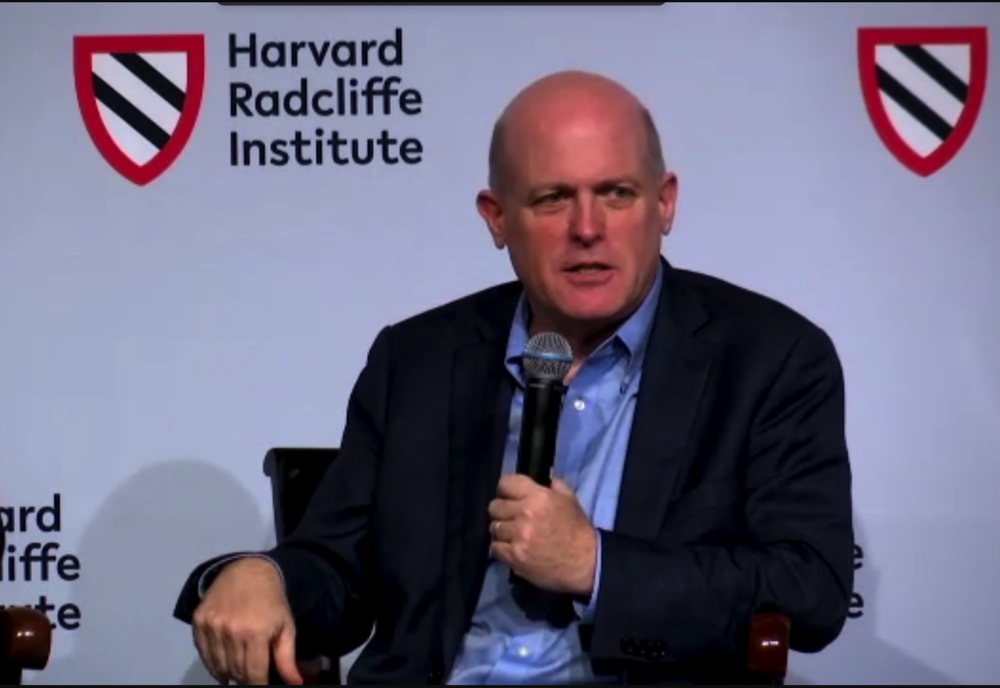
Daniel Schrag
Screenshot by Harvard Magazine
Within the academic community, Schrag added, scientists are embracing the hard problems that are perhaps 20 to 30 years away: how to manage an electrical grid in which 60 to 70 percent of supply is from wind and solar production (up from the current 14 percent); how to decarbonize home heating; and how to decarbonize the production of cement and steel.
Lea professor of the history of science Naomi Oreskes addressed the challenges of mobilizing a divided public, many of whom still think climate change could be caused by natural variability. The fossil-fuel industry and other economic interests continue sophisticated misinformation and disinformation campaigns, she said. And there are many people and communities that rely on the fossil-fuel industry for their livelihood. “We say don't worry, we'll make you whole, we'll figure out a transition, but we don't have a clear picture of what that transition looks like,” she noted. “And we don't have a good track record of… keeping people whole when you think about what happened to the industrial Midwest after NAFTA [the North American Free Trade Agreement]….We can have the best science in the world,” she continued. “But if people don’t accept it—if people aren’t willing to act on it—it doesn’t matter.
That, Oreskes said, is “one reason why I think it’s so important that the new institute will be genuinely interdisciplinary, and really take seriously the cultural, sociological, and economic aspects of this process.”
Harvard’s Role
Asked what Harvard can do that is special, Toffel described a project he is undertaking with other faculty members to figure out how to embed climate change into the core curriculum of any business school. “Harvard Business School [HBS] is a major source of pedagogical materials at M.B.A. programs around the world,” he explained. “We are one of the major producers of case studies, with teaching notes that help instructors figure out how to make sense of the case in front of their students.” As he observed, “We're going to be taking a hard look at what are the core concepts that need to be taught. And then we're going to develop those cases…to make [climate change] teachable by faculty who don't know anything about climate, and may not care that much about climate per se, except for what they read in the news. We should be teaching carbon accounting, not just financial accounting,” for example, and about the impacts of a changing climate on “operations and supply chains.”
“I have great aspirations,” he added, “that in the next two years, were going to see a lot of movement, not only at HBS, which I view as a lab to test and refine the materials, but really around the world to adopt those materials.”
After provost Alan Garber and president Lawrence S. Bacow (via video message, regretting that he could not attend in person) thanked the Salatas for their gift, Burbank professor of political economy James Stock, who was named vice provost for climate and sustainability in September 2021 and will serve as the inaugural director of the Salata Institute, gave a sober assessment of the current climate situation. The Paris Agreement, signed in 2015, aspired to a global goal of limiting warming to 1.5 degrees Celsius, and to keep long-term temperatures well below 2 degrees in this century. Stock noted that the United States is still not close to a trajectory that would hold warming to two degrees Celsius, even with the incentives for carbon-free energy in the recently passed Inflation Reduction Act.
“Moreover,” he continued, “Time is not on our side.” He amplified:
The severe impacts of climate change are now upon us sooner than many scientists expected. The heat waves in Southeast Asia last spring, the recent flooding in Pakistan, the wildfires in the American West, the drying of the Colorado River in the U.S. and the rivers of Europe—all have been worsened by climate change. And these climate catastrophes are not the new normal. Rather, the new normal is that these climate catastrophes will get worse. At this pivotal moment, we urgently must do more. Governments must do more, the private sector must do more, and universities, which stand among the world’s greatest and most enduring institutions, must do more. Finding solutions to climate challenges will require new technologies, improved science, new health solutions, new approaches to human systems, and new understandings of how we frame ourselves living within the natural world. Within these challenges are many big questions to which the answers are at best, dimly understood, yet so much hinges on answering them.
As President Bacow wrote last fall, Harvard must stand among the world leaders in addressing this challenge. Today, through the generosity of Melanie and Jean Salata, Harvard is taking a major step towards this ambition. The mission statement of the Salata Institute for Climate and Sustainability is to develop and promote effective, durable and equitable solutions to the climate change challenges confronting humanity. A central such climate challenge is driving the transition from an economic system powered by fossil fuels to one based on clean energy. But the mission statement is much broader than the energy transition and encompasses the scientific, political, economic, health, ecosystems, and legal aspects of climate change and its impacts, to name a few. To achieve its mission, the Salata Institute will bring together faculty and students from different disciplines and different schools to work on some of the most important and most difficult climate problems of our time. The Institute will also support teaching initiatives and climate related fields, and we’ll support and engage students and alumni committed to climate progress.
Stock, who worked on reducing emissions in the electric power industry as a member of President Barack Obama’s Council of Economic Advisers in 2013 and 2014, has had a busy first year as vice provost, culminating in a report on climate education that was released in September. That report recommended:
- hiring faculty (FAS aims to hire three new faculty during the next two years as part of a cluster search that will be coordinated with the School of Engineering and Applied Sciences, which is seeking four scholars in climate science, energy science, and technology);
- establishing a standing committee on climate education to serve the entire University;
- creating a climate education accelerator program to make strategic investments in climate-related teaching and learning; and
- appointing an advisory committee on external education efforts.
The report also emphasized the need to “recognize and resist the risk of addressing the complexity of climate change by incorporating it in shallow ways leading to students who end up engaging in superficial advocacy rather than in the essential, but harder, intellectual and creative work of developing solutions to the complicated challenges, and assessing difficult tradeoffs.”
As Stock noted in his remarks, in addition to significant research awards for teams working on climate challenges and a seed grant program “The Institute will also focus on education, both on campus and online. Perhaps our greatest impact and legacy comes from the thousands of students we send into the world as leaders. The founding of the Institute provides an opportunity for us to rethink how best to prepare those leaders for a world beset by climate change, the energy transition, and social disruption.” Sound and apppropriate climate education, he said, “must both communicate what we know now and prepare students for the unknown challenges ahead.” He encouraged the audience to read the underlying “excellent report.”
A Global Question, a Global Challenge
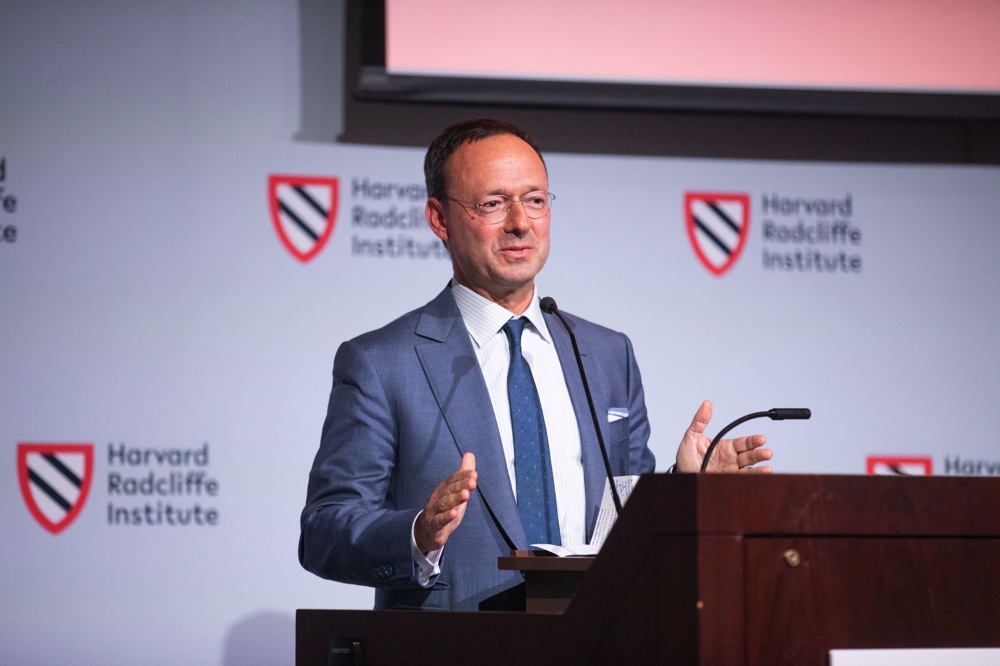
Jean Salata
Photograph by Kris Snibbe/HPAC
Jean Salata spoke last, noting “The geopolitics of the world have put in reverse the globalization that many of us have lived through over the past 30 or 40 years, and made the world a very difficult and challenging place to live.” He cited post-pandemic disruptions, the first war in Europe since the 1940s, and an energy crisis. But climate change, he said, is perhaps the defining question of our generation, and “for my wife and I, it’s probably the defining question for our children and our children’s children.”
Salata noted that Harvard’s climate initiative is multidisciplinary, and leverages the scale, stature, and convening power of the University… “in ways that could really have an impact and make a difference…. I’m optimistic that we can crack this and solve this. It’s not going to be easy,” he acknowledged. “The Salata Institute isn’t going to do it alone. Harvard isn’t going to do it alone. The United States isn’t going to do it alone. It’s a global question. It’s a global challenge.”
